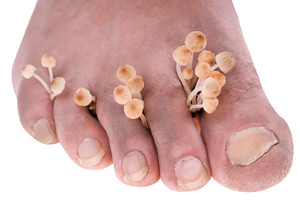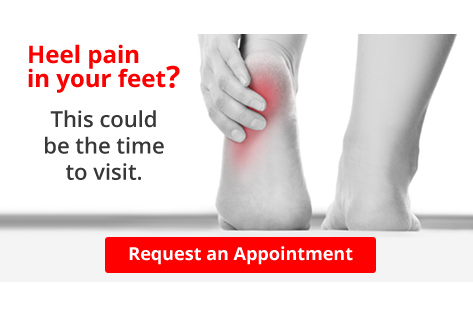Blog
Heel Pain Can Be Treated!
Lack of Moisture in the Heel Pads May Cause Cracked Heels
 The condition that is known as cracked heels is also referred to as thickened heels. There are several reasons why this ailment may develop. These include standing for the majority of the day, wearing shoes that have an open back, or they may form as a result of a vitamin deficiency. If cracked heels are left untreated, severe pain, discomfort and bleeding may exist. They develop when there is a lack of moisture in the fat pad which can cause the skin to become dry and callused. Patients who are obese may suffer from this condition, which causes this ailment to develop from added pressure the heels must endure. Mild relief may be found when the feet are soaked in warm water, followed by using a moisturizer on the heels. This helps to soften dry skin, and can add moisture to the heels. If you are afflicted with cracked heels, please consult with a podiatrist who can offer correct treatment options.
The condition that is known as cracked heels is also referred to as thickened heels. There are several reasons why this ailment may develop. These include standing for the majority of the day, wearing shoes that have an open back, or they may form as a result of a vitamin deficiency. If cracked heels are left untreated, severe pain, discomfort and bleeding may exist. They develop when there is a lack of moisture in the fat pad which can cause the skin to become dry and callused. Patients who are obese may suffer from this condition, which causes this ailment to develop from added pressure the heels must endure. Mild relief may be found when the feet are soaked in warm water, followed by using a moisturizer on the heels. This helps to soften dry skin, and can add moisture to the heels. If you are afflicted with cracked heels, please consult with a podiatrist who can offer correct treatment options.
Cracked heels are unsightly and can cause further damage to your shoes and feet. If you have any concerns, contact one of our podiatrists from Pennsylvania. Our doctors can provide the care you need to keep you pain-free and on your feet.
Cracked Heels
Cracked heels appear unappealing and can make it harder for you walk around in sandals. Aside from looking unpleasant, cracked heels can also tear stockings, socks, and wear out your shoes. There are several methods to help restore a cracked heel and prevent further damage.
How Do You Get Them?
Dry skin is the number one culprit in creating cracked heels. Many athletes, walkers, joggers, and even swimmers suffer from cracked heels. Age and skin oil production play a role to getting cracked heels as well.
Promote Healing
Over the counter medicines can help, especially for those that need instant relief or who suffer from chronic dry feet.
Wear Socks – Wearing socks with medicated creams helps lock in moisture.
Moisturizers – Applying both day and night will help alleviate dryness which causes cracking.
Pumice Stones – These exfoliate and remove dead skin, which allows for smoother moisturizer application and better absorption into the skin.
Change in Diet
Eating healthy with a well-balanced diet will give the skin a fresh and radiant look. Your body responds to the kinds of food you ingest. Omega-3 fatty acids and zinc supplements can also revitalize skin tissue.
Most importantly, seek professional help if unsure how to proceed in treating cracked heels. A podiatrist will help you with any questions or information needed.
If you have any questions, please feel free to contact one of our offices located in Plymouth Meeting and Ambler, PA . We offer the newest diagnostic and treatment technologies for all your foot care needs.
Lack of Moisture in the Heel Pads May Cause Cracked Heels
 The condition that is known as cracked heels is also referred to as thickened heels. There are several reasons why this ailment may develop. These include standing for the majority of the day, wearing shoes that have an open back, or they may form as a result of a vitamin deficiency. If cracked heels are left untreated, severe pain, discomfort and bleeding may exist. They develop when there is a lack of moisture in the fat pad which can cause the skin to become dry and callused. Patients who are obese may suffer from this condition, which causes this ailment to develop from added pressure the heels must endure. Mild relief may be found when the feet are soaked in warm water, followed by using a moisturizer on the heels. This helps to soften dry skin, and can add moisture to the heels. If you are afflicted with cracked heels, please consult with a podiatrist who can offer correct treatment options.
The condition that is known as cracked heels is also referred to as thickened heels. There are several reasons why this ailment may develop. These include standing for the majority of the day, wearing shoes that have an open back, or they may form as a result of a vitamin deficiency. If cracked heels are left untreated, severe pain, discomfort and bleeding may exist. They develop when there is a lack of moisture in the fat pad which can cause the skin to become dry and callused. Patients who are obese may suffer from this condition, which causes this ailment to develop from added pressure the heels must endure. Mild relief may be found when the feet are soaked in warm water, followed by using a moisturizer on the heels. This helps to soften dry skin, and can add moisture to the heels. If you are afflicted with cracked heels, please consult with a podiatrist who can offer correct treatment options.
Cracked heels are unsightly and can cause further damage to your shoes and feet. If you have any concerns, contact Dr. Michael E. Newman from Pennsylvania. Our doctors can provide the care you need to keep you pain-free and on your feet.
Cracked Heels
Cracked heels appear unappealing and can make it harder for you walk around in sandals. Aside from looking unpleasant, cracked heels can also tear stockings, socks, and wear out your shoes. There are several methods to help restore a cracked heel and prevent further damage.
How Do You Get Them?
Dry skin is the number one culprit in creating cracked heels. Many athletes, walkers, joggers, and even swimmers suffer from cracked heels. Age and skin oil production play a role to getting cracked heels as well.
Promote Healing
Over the counter medicines can help, especially for those that need instant relief or who suffer from chronic dry feet.
Wear Socks – Wearing socks with medicated creams helps lock in moisture.
Moisturizers – Applying both day and night will help alleviate dryness which causes cracking.
Pumice Stones – These exfoliate and remove dead skin, which allows for smoother moisturizer application and better absorption into the skin.
Change in Diet
Eating healthy with a well-balanced diet will give the skin a fresh and radiant look. Your body responds to the kinds of food you ingest. Omega-3 fatty acids and zinc supplements can also revitalize skin tissue.
Most importantly, seek professional help if unsure how to proceed in treating cracked heels. A podiatrist will help you with any questions or information needed.
If you have any questions, please feel free to contact one of our offices located in Plymouth Meeting and Ambler, PA. We offer the newest diagnostic and treatment technologies for all your foot care needs.
Read more about Solutions for Cracked HeelsAthlete's Foot Causes Itching
 The symptoms that are associated with athlete’s foot consist of itching between the toes or on the bottom of the feet. In severe cases, blisters may form on the sole of the feet. It is produced by a fungal infection and is known to be contagious. The type of fungus that causes this condition lives in warm and moist environments. These include places such as public pools, showers, or locker rooms. Additionally, wearing damp socks and shoes for the majority of the day may contribute to getting athlete’s foot. There may be measures that can be taken to possibly prevent athlete’s foot. These include wearing shoes and socks that are made of breathable materials and wearing appropriate shoes while in public environments. If you have contracted athlete’s foot, it is advised to speak with a podiatrist who can begin the proper treatment.
The symptoms that are associated with athlete’s foot consist of itching between the toes or on the bottom of the feet. In severe cases, blisters may form on the sole of the feet. It is produced by a fungal infection and is known to be contagious. The type of fungus that causes this condition lives in warm and moist environments. These include places such as public pools, showers, or locker rooms. Additionally, wearing damp socks and shoes for the majority of the day may contribute to getting athlete’s foot. There may be measures that can be taken to possibly prevent athlete’s foot. These include wearing shoes and socks that are made of breathable materials and wearing appropriate shoes while in public environments. If you have contracted athlete’s foot, it is advised to speak with a podiatrist who can begin the proper treatment.
Athlete’s Foot
Athlete’s foot is often an uncomfortable condition to experience. Thankfully, podiatrists specialize in treating athlete’s foot and offer the best treatment options. If you have any questions about athlete’s foot, consult with one of our podiatrists from Pennsylvania. Our doctors will assess your condition and provide you with quality treatment.
What Is Athlete’s Foot?
Tinea pedis, more commonly known as athlete’s foot, is a non-serious and common fungal infection of the foot. Athlete’s foot is contagious and can be contracted by touching someone who has it or infected surfaces. The most common places contaminated by it are public showers, locker rooms, and swimming pools. Once contracted, it grows on feet that are left inside moist, dark, and warm shoes and socks.
Prevention
The most effective ways to prevent athlete’s foot include:
- Thoroughly washing and drying feet
- Avoid going barefoot in locker rooms and public showers
- Using shower shoes in public showers
- Wearing socks that allow the feet to breathe
- Changing socks and shoes frequently if you sweat a lot
Symptoms
Athlete’s foot initially occurs as a rash between the toes. However, if left undiagnosed, it can spread to the sides and bottom of the feet, toenails, and if touched by hand, the hands themselves. Symptoms include:
- Redness
- Burning
- Itching
- Scaly and peeling skin
Diagnosis and Treatment
Diagnosis is quick and easy. Skin samples will be taken and either viewed under a microscope or sent to a lab for testing. Sometimes, a podiatrist can diagnose it based on simply looking at it. Once confirmed, treatment options include oral and topical antifungal medications.
If you have any questions, please feel free to contact one of our offices located in Plymouth Meeting and Ambler, PA . We offer the newest diagnostic and treatment technologies for all your foot care needs.

